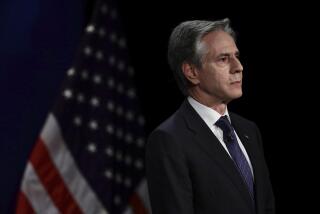Russia Warns GOP Congress on ‘Outbursts’ Over Aid : Diplomacy: Attempts to tie U.S. help to specific behavior by Moscow will complicate relations, a Foreign Ministry spokesman says.
- Share via
MOSCOW — Russia warned the new, Republican-led U.S. Congress on Tuesday to refrain from “confrontational outbursts” and appeals to “punish Russia” by restricting American aid.
The unusually strong warning by Russian Foreign Ministry spokesman Grigory Karasin was a response to a bill introduced last month in the House of Representatives by Rep. Gerald B.H. Solomon (R-N.Y.), one of a growing number of GOP lawmakers who want to make U.S. aid dependent on Russia’s arms-control policies, its behavior toward its neighbors and its progress toward a free-market economy.
“It’s not that we are afraid of the prospect of scaled-down American assistance,” Karasin said at a news briefing. “The issue is different. The confrontational outbursts in Congress are fraught with serious complications in our relations and do not meet the national interests of the United States itself.
“Our partnership, initiated by the Republican Administration and successfully continued by the Democratic Administration, is too important to the fate of international peace for anyone to try to make it hostage to opportunistic interests and partisan squabbles.”
Karasin said Congress is dominated by “people who have set for themselves the aim of undermining the positive tendency in Russian-American relations, of hurling them back to the times not only of the cold peace but of the Cold War.”
“Calls are sounding to punish Russia to make the development of our relations dependent on the fulfillment of conditions that are incompatible with any principles of international law, such as respect for sovereignty and respect for internal affairs,” he said.
Over the past two years, the United States and Russia have been growing apart over issues such as the eastward expansion of the North Atlantic Treaty Organization and Russian efforts to end international sanctions against Iraq.
But Karasin’s unsolicited remarks Tuesday were a poignant sign of new strains growing since last November’s Republican sweep of Capitol Hill and the outbreak of war in Chechnya in December.
Secretary of State Warren Christopher told his Russian counterpart, Foreign Minister Andrei D. Kozyrev, last month that Moscow had been foolish to launch the war. Christopher warned that unless the war was halted, Congress might oppose a $6-billion loan by the International Monetary Fund that Russia is seeking.
Besides Solomon, congressional opponents of aid to Russia include Rep. Sonny Callahan (R-Ala.), the new GOP chairman of the House Appropriations subcommittee that controls foreign assistance.
But like the Clinton Administration’s response to the war in Chechnya, congressional criticism has been muted by concerns over what seems to be the increasingly tenuous hold that Russian President Boris N. Yeltsin has on power.
“There is a lot of concern over what is happening in Russia, and particularly Chechnya, but at the same time there is even more concern over Yeltsin and what the alternative to him would be,” said a senior GOP aide on the House International Relations Committee.
Other analysts added that, while aid to Russia will figure prominently in this year’s debate over the $14.8-billion foreign aid budget, the outlook for Solomon’s bill is uncertain. The International Relations and Banking committees have jurisdiction over it and, sharing the Administration’s ambivalence over Chechnya, neither seemed likely to take it up soon.
More to Read
Sign up for Essential California
The most important California stories and recommendations in your inbox every morning.
You may occasionally receive promotional content from the Los Angeles Times.













